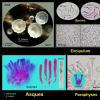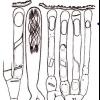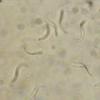
05-03-2026 10:07
Hulda Caroline HolteHello, I found and collected this species growing

19-02-2026 17:49
Salvador Emilio JoseHola buenas tardes!! Necesito ayuda para la ident

03-03-2026 20:34
 Miguel Ángel Ribes
Miguel Ángel Ribes
Good eveningThese small, amphora-shaped perithecia

01-03-2026 18:02
 Francois Guay
Francois Guay
I found this mystery Helotiales on an incubated le

28-02-2026 14:43
A new refrence desired :Svanidze, T.V. (1984) Novy

01-03-2026 18:46
 Robin Isaksson
Robin Isaksson
Hi! This species i se from time to time in the
Disco. inconnu
Roland Labbé,
09-02-2009 16:36
Voici une planche d'un Discomycète qui m'est inconnu.
Ses spores particulières devraient normalement orientées dans son identification, mais que je n'ai pu faire.
Merci, Roland
Détails :
Date de récolte: 2009 / 02 / 06
Substrat : culture intérieure sur une bûche assez décomposée de peuplier faux-tremble
Sporée non disponible
Spores sigmoïdes, lisses, 7-9 x 0,5-0,7 µm, 7,5 x 0,6 µm en moyenne(10 spores), Q = 12,5
Asques simples ou parfois ramifiés à la base, inamyloïdes à l’apex, 22 x 3 µm en moyenne
Paraphyses subcapitées, non septées, à fort contenu huileux homogène et réfringent (à 80% et plus), non guttulées ou rarement avec 1 grosse guttule et incrustation à l'apex, 18-23 x 3 µm
Excipulum en textura globulosa, à cellules subglobuleuses à globuleuses jusqu'à 25 µm de diam.
N.B. Il a été impossible de de déduire le nombre de spores par asque ni leur disposition.
François Valade,
09-02-2009 16:41

Re:Disco. inconnu
Bonjour
une espèce pour Zotto, peut être pas loin d'Orbilia crystallina. Voir sur son site dédié à ce groupe.
François
une espèce pour Zotto, peut être pas loin d'Orbilia crystallina. Voir sur son site dédié à ce groupe.
François
François Valade,
09-02-2009 17:03

Re:Disco. inconnu
ma proposition est peut être une anerie, un regard vite sur le site montre quil y a d'autres espèces à marge dentée. le mieux est de dérouler la clé du DVD.
Roland Labbé,
09-02-2009 17:09
Re:Disco. inconnu
J'attends donc une réponse de Zotto avant de poursuivre.
Roland
Roland
Hans-Otto Baral,
09-02-2009 22:13

Re:Disco. inconnu
Hi Roland & Francois
it is actually Orbilia (formerly Hyalinia) crystallina, but we had to change the name of the fungus to O. crenatomarginata Höhnel because transfer to Orbilia is blocked.
There seem to exist only a few reports of this species from N-America, e.g., by Kanouse (1936). Therefore I would like to note your collection data. Also we never had this species on conifers. How sure is this, did you recognize conifer from bark, or did you look at the wood microstructure?
I add a sketch showing the spore orientation which is difficult to see even within the living asci: the spores contain an apical spore body, and the lower of the 8 spores are inverted. In dead asci you have no chance to see these details, with any applied staining reagent.
Zotto
it is actually Orbilia (formerly Hyalinia) crystallina, but we had to change the name of the fungus to O. crenatomarginata Höhnel because transfer to Orbilia is blocked.
There seem to exist only a few reports of this species from N-America, e.g., by Kanouse (1936). Therefore I would like to note your collection data. Also we never had this species on conifers. How sure is this, did you recognize conifer from bark, or did you look at the wood microstructure?
I add a sketch showing the spore orientation which is difficult to see even within the living asci: the spores contain an apical spore body, and the lower of the 8 spores are inverted. In dead asci you have no chance to see these details, with any applied staining reagent.
Zotto
Roland Labbé,
10-02-2009 01:52
Re:Disco. inconnu
Hi Zotto !
The Orbilia crystallina as grown on a very old stump without bark.
The wood will be studied soon and I will give you the result.
We are not sure if it's a conifer.
If you want some specimens of this Orbilia, we can send them to you.
We have about 20 very little ascoma.
Give me your adress and they will start immediatly.
I appreciate your collaboration, specially your figure and explanations.
I thank you cordially.
Roland
The Orbilia crystallina as grown on a very old stump without bark.
The wood will be studied soon and I will give you the result.
We are not sure if it's a conifer.
If you want some specimens of this Orbilia, we can send them to you.
We have about 20 very little ascoma.
Give me your adress and they will start immediatly.
I appreciate your collaboration, specially your figure and explanations.
I thank you cordially.
Roland
Roland Labbé,
10-02-2009 07:06
Re:Disco. inconnu
Mr. Barral, I don't understand clearly this phrase :
It is actually Orbilia (formerly Hyalinia) crystallina, but we had to change the name of the fungus to O. crenatomarginata Höhnel because transfer to Orbilia is blocked.
Would you please give me more précision.
Roland
It is actually Orbilia (formerly Hyalinia) crystallina, but we had to change the name of the fungus to O. crenatomarginata Höhnel because transfer to Orbilia is blocked.
Would you please give me more précision.
Roland
François Valade,
10-02-2009 07:27

Re:Disco. inconnu
Je vais tenter d'expliquer
Helotium crystallinum Quélet a été transféré dans le genre Orbilia par Zotto en 1994.
Or il existait déjà Orbilia crystallina Rodway en date de 1919 (ou 1920). Donc la combinaison de Zotto est impossible car préoccupée.
Il a donc rechercher un synonyme postérieur et a trouvé Orbilia crenatomarginata Höhnel.
François
Helotium crystallinum Quélet a été transféré dans le genre Orbilia par Zotto en 1994.
Or il existait déjà Orbilia crystallina Rodway en date de 1919 (ou 1920). Donc la combinaison de Zotto est impossible car préoccupée.
Il a donc rechercher un synonyme postérieur et a trouvé Orbilia crenatomarginata Höhnel.
François
Hans-Otto Baral,
10-02-2009 12:23

Re:Disco. inconnu
Merci Francois! I only add that Orbilia crystallina Rodway appears to be a member of the Pezizales, nevertheless it blocks transfer of our orbiliaceous fungus to Orbilia.
Roland, I would be happy to see your material, yes. Then I could also check the wood anatomy.
My address is
Hans-Otto Baral
Blaihofstr. 42
D-72074 Tübingen
Germany
Roland, I would be happy to see your material, yes. Then I could also check the wood anatomy.
My address is
Hans-Otto Baral
Blaihofstr. 42
D-72074 Tübingen
Germany
Roland Labbé,
10-02-2009 14:02
Re:Disco. inconnu
OK, It's now clear for me.
I will send to you our materiel and a peace of wood.
Thank Zotto et François.
Roland
I will send to you our materiel and a peace of wood.
Thank Zotto et François.
Roland
Hans-Otto Baral,
17-02-2009 17:16

Re:Disco. inconnu
Hi Roland & Jacqueline
today arrived your specimen, thanks! I confirm Orbilia crenatomarginata, and I identified the wood as ?Salix. Is that possible? It is clearly not coniferous, perhaps Populus. What trees are there? Did the Orbilia grow inside the stump?
I am highly astonished about your spore photos. How did you manage to get the whole spore sharp, did you use a combine program? Here is my photo of your spores. The spores are stringly helicoid, always twisted like a righthand-thread, therefore impossible to get sharp as a whole.
If you have your plate in highr resolution, I would be very glad to use your spore photo in our monograph (of course by citing you as author). Here is my address: zotto @ arcor . de .
Is 50077 Jacqueline's herbarium number? I still miss the collection data (site name, close village, town, perhaps altitude, collector).
Thanks
Zotto
today arrived your specimen, thanks! I confirm Orbilia crenatomarginata, and I identified the wood as ?Salix. Is that possible? It is clearly not coniferous, perhaps Populus. What trees are there? Did the Orbilia grow inside the stump?
I am highly astonished about your spore photos. How did you manage to get the whole spore sharp, did you use a combine program? Here is my photo of your spores. The spores are stringly helicoid, always twisted like a righthand-thread, therefore impossible to get sharp as a whole.
If you have your plate in highr resolution, I would be very glad to use your spore photo in our monograph (of course by citing you as author). Here is my address: zotto @ arcor . de .
Is 50077 Jacqueline's herbarium number? I still miss the collection data (site name, close village, town, perhaps altitude, collector).
Thanks
Zotto


